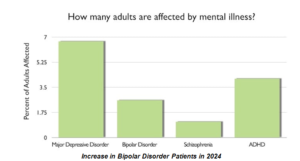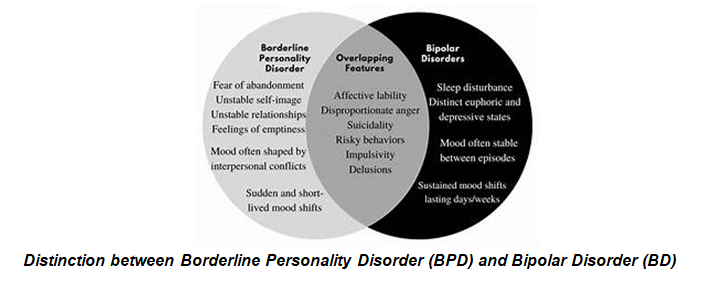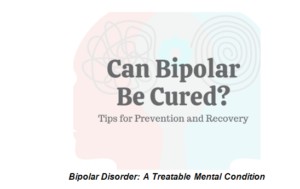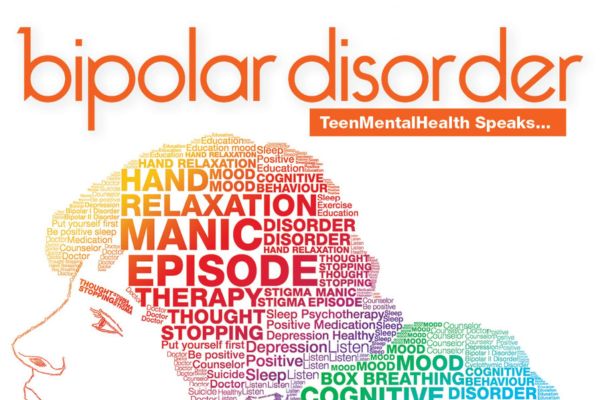Celebrating Hope: March 30, bipolar awareness day
Are you hiding the polarization in views scooping in your head? Why are you confused when selecting between your favorite clothing brands? Unfortunately, we are unable to recognize early symptoms of mental disintegration. Mental wellness has been a grave concern for all of us. One out of five adults suffer from any mental ailment.
Moreover, without knowing the severity of your mood swings, your life can be at mortality risk. Nearly 40 million people across the world are victimized by Bipolar disorder mental illness. There is a 6% growth rate of falling for depression, anxiety, and mania in 2024 that has been escalating per year.
 Do you feel that your insights into things sway from normal human beings? You may be diagnosed with mood swings and symptoms, where you can experience manic or depressive episodes lasting for at least one week. Whether you feel anxiety, depression, or panic attacks in a repeated pattern, you tend to have bipolar disorder illness. Doctors and Psychiatrists diagnose bipolar disorder based on the frequency of your repeated behaviors. Mental health awareness is the critical element that focuses on mental health patients. Your family and friends must be aware of the facts of how to deal with your symptoms as a mentally depressed person. You will learn about the insights and frequently asked questions regarding bipolar disorder through this blog.
Do you feel that your insights into things sway from normal human beings? You may be diagnosed with mood swings and symptoms, where you can experience manic or depressive episodes lasting for at least one week. Whether you feel anxiety, depression, or panic attacks in a repeated pattern, you tend to have bipolar disorder illness. Doctors and Psychiatrists diagnose bipolar disorder based on the frequency of your repeated behaviors. Mental health awareness is the critical element that focuses on mental health patients. Your family and friends must be aware of the facts of how to deal with your symptoms as a mentally depressed person. You will learn about the insights and frequently asked questions regarding bipolar disorder through this blog.
Common Symptoms of Bipolar Disorder: Are You Experiencing Them?
Try to visualize the state of confusion where you are unable to reach any one decision or choice, your exposure of thoughts gets dispersed, or you feel anxious, agitated, or depressed for undue reasons. There is a high likelihood that you might have bipolar disorder.
When Do BD Patients Start to Feel Delusional? How Can Stress Lead to Phobias?
Hypo-mania is the emotionally high
As per the National Institute of Health (NIH), 30% of untreated BD patients commit suicide during their hypo mania or mania stage. Suicide attempts are associated with psychopathology, causing injury, trauma, and mortality in BD patients. You should be alert if you experience such symptoms.
sentiments where you are unable to distinguish between delusions and reality. Excessive weird talking and phobias can endanger your life. At this stage, there are high chances of committing suicide.
Sometimes, unusual or relatively high sexual arousal and grandiosity are other high alerts that you must be careful. If you feel extreme sex orientations or poor sleeping patterns, you might have symptoms of manic or hypo manic episodes. On the other hand, the desire to do reckless driving or overspending can trigger your elevated emotions and are the early warnings of your hypo-mania BD symptoms.
Battling Extreme Guilt: What's Behind The Link Between BD and Feelings of Guilt?
Do you think you are good for nothing and unworthy? Do you spend too much on shopping? There are instances when you feel guilty about the things you encountered or thought about. For example, if you feel grandiosity for someone, and you feel embarrassed, or you want something precious, and you either want to steal it or steal it out of lust, you might be suffering from BD depressive episodes. If your depression phase lasts more than a week, then there is a high chance of suicidal attempts
Whether you are gaining weight due to a high desire for food like bulimia or significant weight loss or your unstable metabolic rates due to unprecedented eating habits, you can tend to get into a depressive mood. People around you should be cautious about your behavior’s prolonged hopelessness, guilt, or sadness. It becomes your caregivers’ obligation to consult a Psychiatrist or psychologist; their regular sessions with your family and friends can prevent you from any severe danger to your life. You need to update your symptoms to your psychotherapist about the severity of mood swings.
Why Decision-Making Can Feel Overwhelming for Those with Bipolar Disorder? When Fatigue Hits: How Do You Cope with BD in Your Daily Life?
Imagine that you have to select between two beautiful jewelry sets and start contemplating it for a few days or that you have to give analytical views about your project. You might get confused for a long time about how to interpret it logically, and difficulty reaching conclusive actions is another symptom of BD patients.

Whether you have been unclean and untidy for a long or your room is messed up with clutter, and you feel a lack of interest in cleaning the space around you, you need help. Avoiding regular home chores and cleaning up can lead to disorder in your behavior. Repetition of these habits can be high alerts, as disorganized habits prevail over behavior disorders. Thus, you should not avoid routine tasks and hygienic habits.
Key Differences About Bipolar Disorder Types; You Should Know
If you experience one severe manic episode followed by a series of depressive episodes within a week, you are suffering from BD one. However, if you feel hypo-mania (less than mania) and one major depressive episode, then you are more prone to BD two. Moreover, suppose you persist in hypo-mania and depressive symptoms for more than two years regularly.
In that case, your Bipolar Disorder type is Cyclothymiacs. You don’t have to encounter one major manic or panic attack. However, your behaviors sometimes do not predict any of the types mentioned earlier. Yet, if you are sadistic, depressive, and irritated, then you are a victim of unspecified BD type and need impairment of thoughts.
Misconceptions About Borderline Personality Disorder (BPD) and Bipolar Disorder (BD)
Both borderline personality disorder (BPD) and bipolar disorder (BD) are characterized by marked instabilities in emotional experience and expression. They have overlapping features, which leads to making a mix-ups between them. The primary distinction between bipolar disorder and borderline personality disorder diagnosis is that bipolar is a category of mood disorders, and BPD is a personality disorder

How to Manage Bipolar Disorder: Simple Tips for a Better Life
Bipolar Disorder is a lifelong mental ailment and condition. If untreated, it can cause severe damage to BD patients. However, you can manage this disease through regular check-ups, medication, and psychotherapies. It is the responsibility of caregivers to monitor the patient’s medical history. Psychiatrists advise mood stabilizers (lithium salt-based), anti-psychotic medications for manic or mixed episodes, antidepressants for depressive episodes, though with caution, and anticonvulsants for sometimes used as mood stabilizers.
During the initial stages, BD patients can refuse to accept the symptoms and take medications. However, with proper counseling, psychotherapy, and caregivers’ help, BD patients can cultivate habits of taking regular medicine.
It’s critical to mention that hospitalization isn’t essential for everyone who has bipolar disorder. Most people can cope with the illness with the proper treatment. Still, in case their symptoms get persistent or are dangerous to themselves or others, admitting them could be the best option.
Bipolar Disorder and You: Ways to Stay Positive
BD patients must exercise Cognitive Behavioral Therapy (CBT) to manage negative thoughts and behaviors. Further, Psycho-education can teach BD patients about bipolar disorder to help them understand and manage their condition. Moreover, Interpersonal and Social Rhythm Therapy (IPSRT) can focus on improving relationships and managing daily routines.
However, Bipolar disorder can shift to Bipolar order by changing lifestyle, maintaining a routine, reducing stress, avoiding substance abuse, and doing regular sleep and exercise. However, after psychiatrists, psychologists, and caregivers, you can increase your life span by monitoring your behaviors; you should join support groups and engage with communities where individuals share experiences that can help reduce feelings of isolation.
Five Signs; It’s Time for a Bipolar Patient to Go to the Hospital
- Severe manic or depressive episodes are the early alerts to get your patient hospitalized. If you feel that person has feelings of insecurity, undue enmity, and poses a danger to others, your BD patients need to be hospitalized immediately. During their weird imaginations, they think of enmity and agony for the world, and their extreme volatility should be treated at proper times.
- Suicidal thoughts or feelings of worthlessness and guilt are also alarming conditions and should be treated at the right time. You can cure and manage your BD symptoms with proper medicine adjustments in a controlled environment.
- Depressive episodes in bipolar disorder can be debilitating, leading to feelings of hopelessness, worthlessness, and suicidal thoughts. If these severe symptoms interfere with daily functioning, hospitalization may be required to ensure safety and provide intensive treatment.
- Some people suffering from a diagnosis of bipolar disorder may enter a psychotic state in either manic or depressive episodes characterized by hallucinations and delusional behavior This can be very serious; therefore, self-responsibility may be removed from the individual in-patient settings.
- Unspecified bipolar disorder patients may suffer from episodes where treatments, medication, or therapy may not help them gain control over their symptoms. In such instances, there may be a need for admission where the patient can undergo a new cycle of therapy with different treatment modalities or just for surveillance reasons
Overcoming Struggles: Success Stories Of Bipolar Disorder Patients
Bipolar disorder can transit to Bipolar order with your determination and conscious efforts. BD patients can be great philosophers, celebrities, artists, and high achievers if they find good people around them who can bring out their creative endeavors.
In ancient times, bipolar disorder was imagined as a divine present from God. Jules Angst and Andreas Marneros, Greek philosophers, characterized Bipolar Disorder as a trait of Hippocrates (460-337 BC), the originators of medical sciences, Physics, and other scientific disciplines. Sir Isaac Newton was subjected to this later in his life.
Vincent Willem van Gogh was a Dutch Post-Impressionist painter who is among the most famous and influential figures in the history of Western art. World Bipolar Day is observed annually on March 30 to raise awareness about bipolar disorder and eliminate social stigma. The date was chosen in honor of the birthday of this famous painter, who is thought by some historians to have had bipolar disorder.
Many creative “geniuses” have admitted having bipolarity, such as actor Mel Gibson, actress and writer Carrie Fisher, actress Catherine Zeta-Jones, and actress Vivien Leigh. Singer Patty Duke and Nina Simone were also diagnosed during their highly successful careers in their respective fields. Ted Turner, the super-rich man, as well as the author/novel writer Ernest Hemingway, were also treated for bipolar disorder.
According to some experts, bipolar disorder is highly present in famous people like CEOs and prominent actors. Numerous American writers, including F Scott Fitzgerald, Sylvia Plath, and John Steinbeck, among many others are believed to have been bipolar as well.
Bipolar Disorder patients can be highly productive because they can think holistically, as they have the power to analyze polarization in thoughts. Their mental disintegration can become coherent and consistent with little help. Love and help your Disorder Disorder patient.
“Let’s remember March 30 not only because we may be part of it but also because we are part of a thrilled club full of artists, creative individuals, business people, politicians, and musicians. They are the unique gems in the world. Treasure their hearts, and they will treasure your world”.


1 Comment
Thanks for sharing. I read many of your blog posts, cool, your blog is very good.